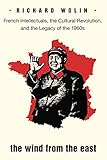The Wind From the East : French Intellectuals, the Cultural Revolution, and the Legacy of the 1960s - Second Edition / Richard Wolin.
Material type: TextPublisher: Princeton, NJ : Princeton University Press, [2017]Copyright date: ©2018Edition: SecondDescription: 1 online resource (464 p.) : 7 b/w illusContent type:
TextPublisher: Princeton, NJ : Princeton University Press, [2017]Copyright date: ©2018Edition: SecondDescription: 1 online resource (464 p.) : 7 b/w illusContent type: - 9780691154343
- 9781400888443
- Communism -- France -- History -- 20th century
- Intellectuals -- Political activity -- France -- History -- 20th century
- Intellectuals -- France -- History -- 20th century
- HISTORY / Modern / 20th Century
- Activism
- Alain Badiou
- Algerian War
- Atavism
- Authoritarianism
- Bolsheviks
- Bourgeoisie
- Capitalism
- Catechism
- Charles de Gaulle
- Civil society
- Class conflict
- Claude Lefort
- Communism
- Communist Party of China
- Comrade
- Criticism
- Cultural Revolution
- Daniel Cohn-Bendit
- Dictatorship
- Dissident
- Emancipation
- Ethos
- Everyday life
- Existentialism
- Feminism (international relations)
- Feminism
- French Communist Party
- French Left
- Gaullism
- Gay liberation
- Homosexuality
- Identity politics
- Ideology
- Imperialism
- Individualism
- Industrial society
- Institution
- Intellectual
- Jacques Lacan
- Jean-Paul Sartre
- Jews
- Julia Kristeva
- Late capitalism
- Left-wing politics
- Leninism
- Liberalism
- Liberation movement
- Louis Althusser
- Madness and Civilization
- Manifesto
- Mao Zedong
- Maoism (Third Worldism)
- Maoism
- Marxism
- Marxism–Leninism
- Marxist humanism
- May 1968 events in France
- Michel Foucault
- Militant (Trotskyist group)
- Militant
- Modernity
- Narcissism
- Narrative
- New Philosophers
- New social movements
- Orthodox Marxism
- Patriarchy
- Philosophy
- Political culture
- Political philosophy
- Political radicalism
- Politician
- Politics
- Post-structuralism
- Protest
- Radicalism (historical)
- Raymond Aron
- Regime
- Republicanism
- Revolutionary Struggle
- Roland Barthes
- Romanticism
- Simone de Beauvoir
- Situationist International
- Socialism with a human face
- Stalinism
- State socialism
- Struggle (TV series)
- Subjectivity
- Surrealism
- Terrorism
- The Other Hand
- Totalitarianism
- Trade union
- Trotskyism
- Vanguardism
- Working class
- World War II
- Writing
- 305.5/52094409046 23
- DC33.7
- online - DeGruyter
| Item type | Current library | Call number | URL | Status | Notes | Barcode | |
|---|---|---|---|---|---|---|---|
 eBook
eBook
|
Biblioteca "Angelicum" Pont. Univ. S.Tommaso d'Aquino Nuvola online | online - DeGruyter (Browse shelf(Opens below)) | Online access | Not for loan (Accesso limitato) | Accesso per gli utenti autorizzati / Access for authorized users | (dgr)9781400888443 |
Frontmatter -- Contents -- Preface to the Second Edition -- Prologue -- Introduction: The Maoist Temptation -- Part I — The Hour of Rebellion -- 1. Showdown at Bruay-en-Artois -- 2. France during the 1960s -- 3. May 1968: The Triumph of Libidinal Politics -- 4. Who Were the Maoists? -- Excursus: On the Sectarian Maoism of Alain Badiou -- Part II — The Hour of the Intellectuals -- 5. Jean-Paul Sartre’s Perfect Maoist Moment -- 6. Tel Quel in Cultural-Political Hell -- 7. Foucault and the Maoists: Biopolitics and Engagement -- 8. The Impossible Heritage: From Cultural Revolution to Associational Democracy -- Bibliography -- Index
restricted access online access with authorization star
http://purl.org/coar/access_right/c_16ec
Michel Foucault, Jean-Paul Sartre, Julia Kristeva, Phillipe Sollers, and Jean-Luc Godard. During the 1960s, a who’s who of French thinkers, writers, and artists, spurred by China’s Cultural Revolution, were seized with a fascination for Maoism. Combining a merciless exposé of left-wing political folly and cross-cultural misunderstanding with a spirited defense of the 1960s, The Wind from the East tells the colorful story of this legendary period in France. Richard Wolin shows how French students and intellectuals, inspired by their perceptions of the Cultural Revolution, and motivated by utopian hopes, incited grassroots social movements and reinvigorated French civic and cultural life.Wolin’s riveting narrative reveals that Maoism’s allure among France’s best and brightest actually had little to do with a real understanding of Chinese politics. Instead, it paradoxically served as a vehicle for an emancipatory transformation of French society. Recounting the cultural and political odyssey of French students and intellectuals in the 1960s, The Wind from the East illustrates how the Maoist phenomenon unexpectedly sparked a democratic political sea change in France.
Mode of access: Internet via World Wide Web.
In English.
Description based on online resource; title from PDF title page (publisher's Web site, viewed 29. Jun 2022)


